As global hiring becomes the new norm, companies are increasingly relying on Employer of Record (EOR) platforms to streamline compliance, payroll, and onboarding across borders. Deel has been a prominent name in this space, offering businesses a centralized way to hire remote employees and contractors in over 150 countries. However, as more organizations seek region-specific expertise, transparent pricing, and personalized support, many are turning to Deel alternatives that better align with their operational goals and budgets.
Whether you’re a startup expanding into Asia, an enterprise hiring across the Middle East, or a remote-first company looking for cost-effective EOR solutions, the right Deel alternative can make a significant impact. In this blog, we break down the top 8 Deel competitors and alternatives in 2025, comparing their strengths, pricing structures, customer support, and regional capabilities—so you can choose the best platform to scale your global team with confidence.
Table of Contents
- What does Deel provide?
- Why should you consider Deel alternatives?
- What are the best Deel alternatives?
- 1. Asanify
- 2. Rippling
- 3. Remote
- 4. Velocity Global
- 5. Papaya Global
- 6. Oyster HR
- 7. Multiplier
- 8. Globalization Partners
- Detailed Comparison of Top 8 Deel Alternatives 2025
- What are the common mistakes to avoid when choosing Deel alternatives?
- How to choose the best Deel alternative?
- Why Choose Asanify for Your Business Expansion?
- FAQs
What does Deel provide?
Deel is a leading HR and payroll platform that allows companies to hire full-time employees and contractors globally without setting up legal entities. It offers a comprehensive suite of services including Employer of Record (EOR), contractor management, automated payroll, tax filings, benefits management, and visa support in over 150 countries. Deel is especially popular among fast-growing startups and enterprises aiming for global workforce expansion. Its strength lies in speed, legal coverage, and self-serve infrastructure, but several challenges have prompted businesses to explore other options.
Why should you consider Deel alternatives?
While Deel has gained significant traction, it’s not without limitations. Businesses often seek Deel alternatives due to concerns around high pricing, limited flexibility, hidden charges, or lack of hands-on support in specific regions. Some companies find Deel’s support system impersonal, while others struggle with compliance in niche markets. Exploring alternatives ensures your organization finds a solution that aligns with your region-specific compliance, onboarding expectations, support quality, and budget.
Reddit Reveals: Common Challenges by Deel Users
Customer Service Issues
User threads on Reddit often highlight unresolved support tickets, minimal live assistance, and delays in getting legal clarifications during onboarding or employee terminations.
Hidden Fees and Pricing Concerns
While Deel promotes a flat-rate model, users have reported additional costs for services like early contract termination, currency conversions, and withdrawal processes.
Product and Service Limitations
In certain regions, Deel’s legal infrastructure is still evolving. Businesses hiring in countries like Vietnam or Saudi Arabia report insufficient documentation and slower onboarding compared to other markets.
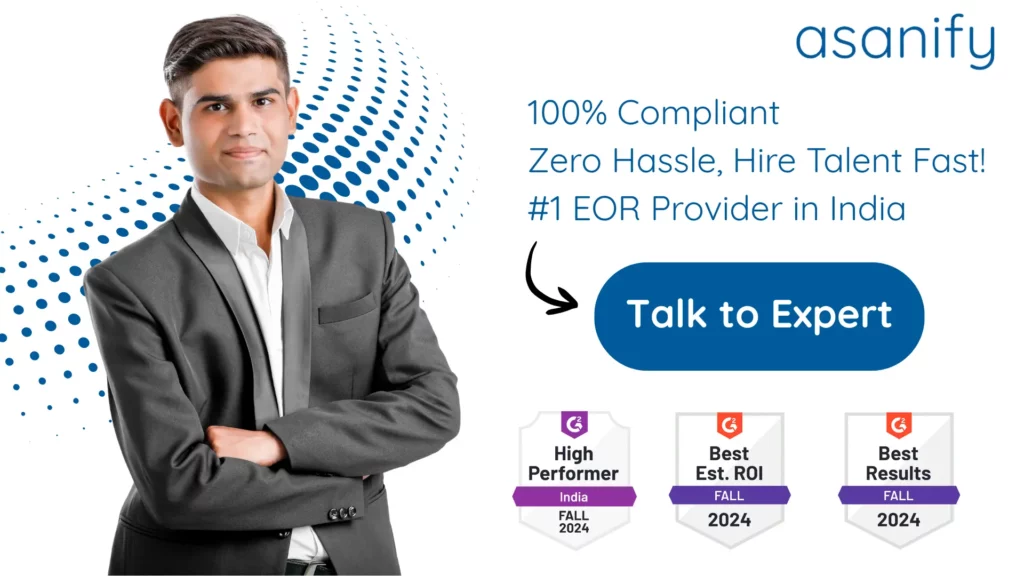
What are the best Deel alternatives?
Deel may not be a one-size-fits-all solution. Depending on your business goals, hiring geography, and support needs, there are robust competitors that offer more tailored services. The following platforms excel in transparency, speed, and region-specific legal expertise while offering competitive pricing.
Top 8 Deel Competitors & Alternatives in 2025:
1. Asanify
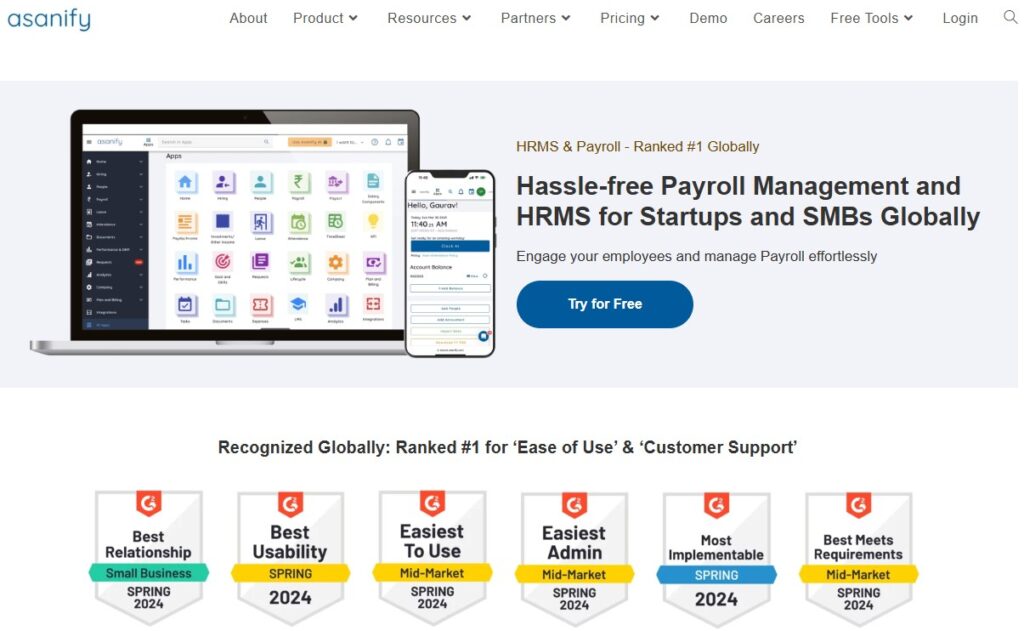
Build your distributed team effortlessly with Asanify’s localized EOR, payroll automation, and HR compliance tools tailored for emerging markets. Asanify is an Asia and MENA-focused Employer of Record (EOR) service provider that empowers global companies to hire full-time employees and contractors in India, Southeast Asia, the Middle East, and Eastern Europe without needing a local legal entity. The platform provides a fully integrated solution covering payroll, compliance, benefits administration, visa sponsorship, and onboarding documentation.
Key Features of Asanify:
- Comprehensive EOR Solution: Full-spectrum HR services including compliant onboarding, payroll, documentation, benefits, and exits.
- Fast Onboarding: Complete employee onboarding and offer issuance within 2–3 business days.
- Regional Compliance: Deep local expertise across India, UAE, Singapore, Poland, and more.
- Localized HR Documentation: Custom employment contracts, tax structures, and offer letters per local regulations.
- Dedicated HR & Legal Support: Assigned regional HR advisors and compliance experts for every client.
- Visa and Work Permit Support: Full immigration assistance for employee mobility.
- Benefits Customization: ESOP structuring, medical insurance, meal cards, and statutory benefits.
- Multi-Currency Payroll: Localized salary disbursement and expense reimbursement via INR, AED, SGD, PLN, etc.
Pricing Structure of Asanify:
- EOR Services: From $99 to $399/month per employee depending on geography and salary slab
- Contractor Management: Starting at $25/month per contractor
- Visa & Immigration Support: Based on country-specific case
- No setup or withdrawal fees
Asanify’s Pros & Cons
| Pros | Cons |
| Asia and MENA specialization | Currently unavailable in the Americas |
| Transparent pricing model | Lacks device management tools |
| Personalized legal and HR advisory | Smaller integration ecosystem |
| Excellent tax optimization features | Regional rather than global reach |
| ESOP & benefits expertise | – |
G2 Rating: 4.8/5
Asanify’s strong regional expertise and affordable pricing make it an ideal choice for global startups and SMEs hiring in emerging markets. Its local HR support, ESOP customization, and visa handling differentiate it from global competitors like Deel.
2. Rippling
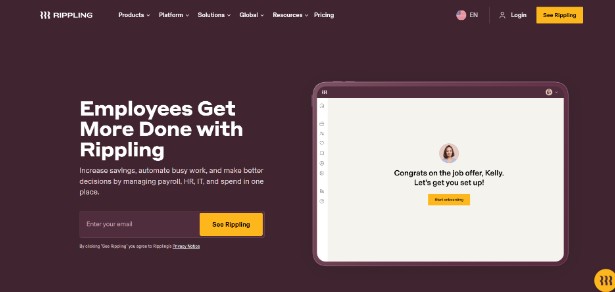
Key Features of Rippling:
- Unified platform for HR, IT, and finance operations
- Supports international EOR and US-based PEO
- Offers onboarding, device management, and app provisioning
- Deep integration with popular business software
Pricing Structure of Rippling:
- Base HR platform starts at $8/user/month
- Add-on EOR pricing customized per geography
Pros and Cons of Rippling
| Pros | Cons |
| All-in-one solution for HR and IT | Complex setup for small teams |
| Deep integrations and automation | Limited global hiring reach |
| Scalable for mid to large enterprises | EOR add-ons can increase costs rapidly |
G2 Rating: 4.6/5
3. Remote
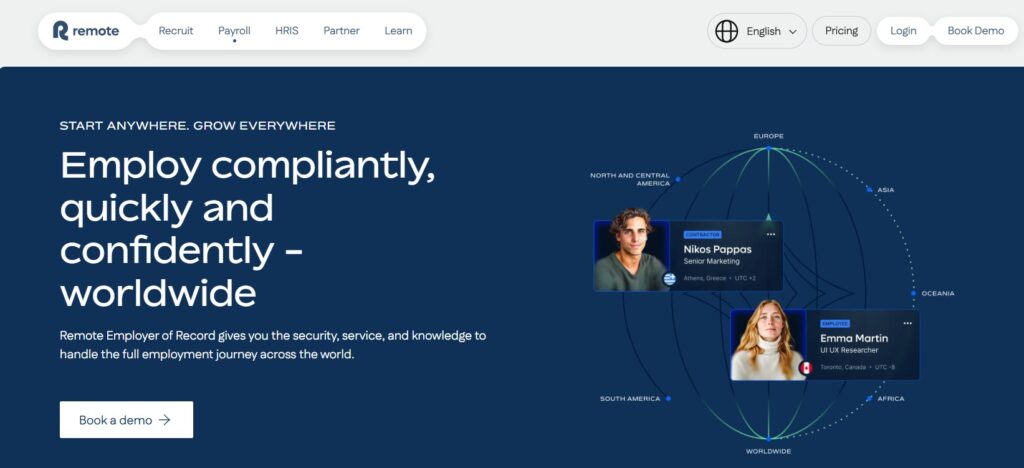
Key Features of Remote:
- Operates its own legal entities in 80+ countries
- Strong IP protection, localized benefits, and GDPR compliance
- Offers equity management and cost calculators
Pricing Structure of Remote:
- Starts at $599/month per employee
- Discounts on annual subscriptions
Pros and Cons of Remote
| Pros | Cons |
| Transparent pricing with no hidden fees | Slower onboarding in some regions |
| Excellent UI/UX | Limited customization for contracts |
| Owns entities (not partner-reliant) | Higher base pricing |
G2 Rating: 4.5/5

4. Velocity Global
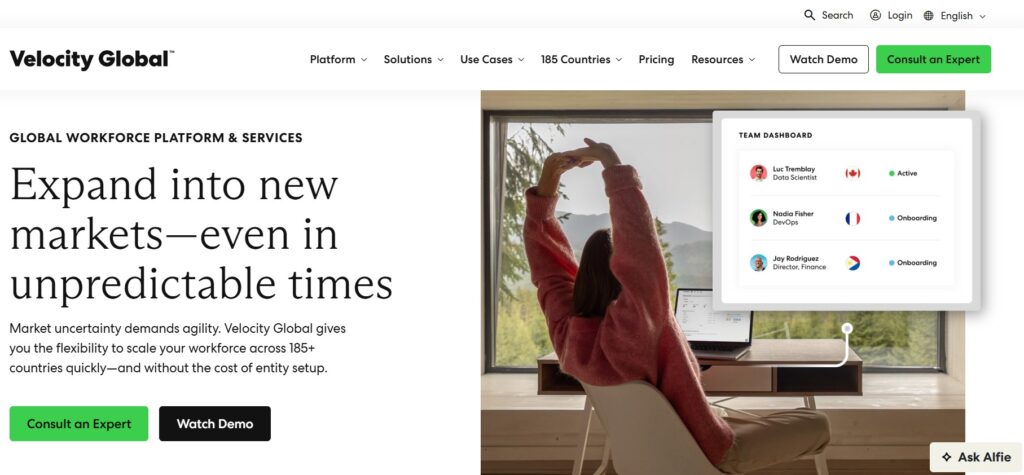
Key Features of Velocity Global:
- Full suite of EOR, PEO, and global expansion services
- Support for M&A transitions, visa sponsorships, and benefits setup
- Tailored legal advisory for enterprise needs
Pricing Structure of Velocity Global:
- Custom quotes based on geography and employee count
Pros and Cons of Velocity Global
| Pros | Cons |
| Scales well with enterprise complexity | Less suitable for early-stage startups |
| Strong visa and legal advisory | Opaque pricing |
| Multiple service models (EOR, PEO, AOR) | Slightly dated UI |
G2 Rating: 4.3/5
5. Papaya Global
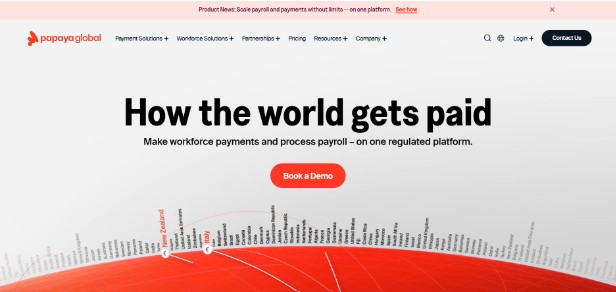
Key Features of Papaya Global:
- Centralized payroll and EOR management dashboard
- AI-powered compliance engine and cost tracking
- Strong analytics, reporting, and integrations
Pricing Structure of Papaya Global:
- Starts at $650/month per employee
- Volume-based pricing for enterprise accounts
Pros and Cons of Papaya Global
| Pros | Cons |
| Advanced analytics and dashboard | Premium pricing tier |
| Real-time payroll tracking | Complexity for smaller companies |
| Scalable across 160+ countries | Limited customization in UI |
G2 Rating: 4.2/5
6. Oyster HR
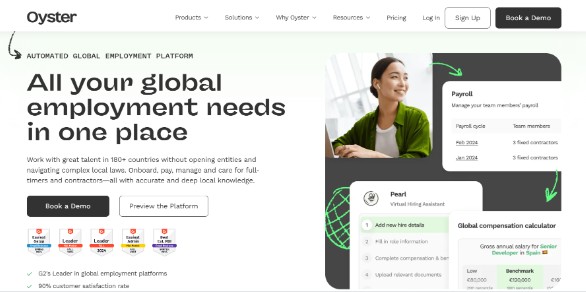
Key Features of Oyster HR:
- Focuses on socially responsible global hiring
- Easy-to-use platform with employee cost estimator
- Provides localized contracts, benefits, and global compliance
Pricing Structure of Oyster HR:
- EOR pricing starts at $499/month
- Free plan available for contractor management
Pros and Cons of Oyster HR
| Pros | Cons |
| Transparent pricing and free contractor plan | Slower setup in newer geographies |
| Great for remote-first teams | Fewer integrations compared to Rippling |
| Clean UI and guided workflows | Limited real-time support |
G2 Rating: 4.4/5
7. Multiplier
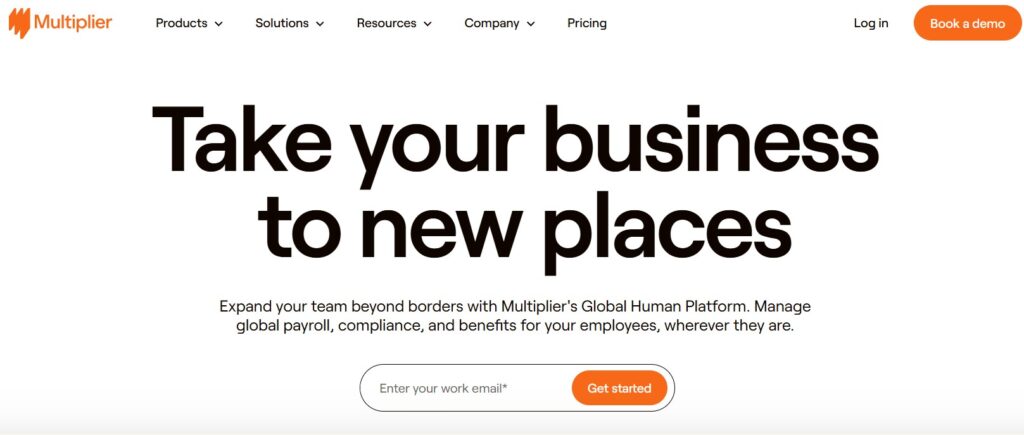
Key Features of Multiplier:
- Global employment, payroll, and benefits management
- Tools for IP protection, compliance, and cost forecasting
- Allows easy conversion of freelancers to full-time employees
Pricing Structure of Multiplier:
- $400–$600/month per employee
- Custom plans for volume hiring
Pros and Cons of Multiplier
| Pros | Cons |
| Cost-effective for fast scaling | Limited employee self-service tools |
| Seamless UI with fast onboarding | Smaller support team |
| Strong contractor to employee pathway | Not ideal for complex equity structures |
G2 Rating: 4.7/5
8. Globalization Partners
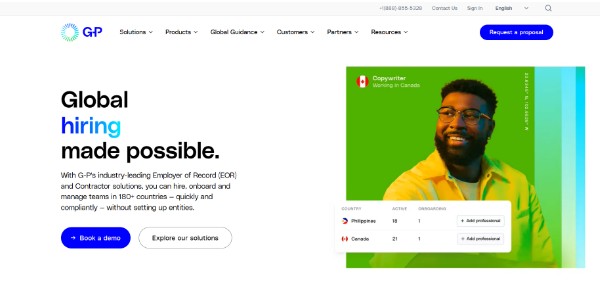
Key Features of Globalization Partners:
- Enterprise-grade platform with strong legal network
- Operates in over 180 countries
- Localized onboarding and global tax compliance
Pricing Structure of Globalization Partners:
- Premium pricing, starting above $600/month
- Tailored enterprise contracts
Pros and Cons of Globalization Partners
| Pros | Cons |
| Strong legal and compliance team | Expensive for small teams |
| Full-service onboarding and support | Slower support response during scaling |
| Suitable for Fortune 500 clients | Less flexible pricing |
G2 Rating: 4.6/5
Detailed Comparison of Top 8 Deel Alternatives 2025
When evaluating Deel competitors, it’s important to compare factors like pricing, legal entity ownership, onboarding speed, regional strengths, benefits administration, and customer service. The table below summarizes key features of the top 8 platforms to help you choose the right solution for your needs.
| Provider | G2 Rating | Starting Price | Strengths |
| Asanify | 4.8/5 | Custom, low flat | Compliance in emerging markets |
| Rippling | 4.6/5 | $8+/user/month | U.S. integrations, all-in-one HR |
| Remote | 4.5/5 | $599/month | Transparent pricing |
| Velocity Global | 4.3/5 | Custom | Enterprise hiring support |
| Papaya Global | 4.2/5 | $650/month | Scalable payroll engine |
| Oyster HR | 4.4/5 | $499/month | Cost calculator, free contractor plan |
| Multiplier | 4.7/5 | $400-$600/month | Simple UI, quick onboarding |
| Globalization Partners | 4.6/5 | Premium | Legal and compliance excellence |
What are the common mistakes to avoid when choosing Deel alternatives?
- Focusing only on pricing while ignoring regional compliance needs
- Overlooking the importance of local labor laws and IP protection
- Failing to test support responsiveness or platform usability
- Choosing a solution that doesn’t align with your hiring scale

How to choose the best Deel alternative?
Start by identifying your company’s most important hiring goals:
- Are you expanding into a specific region?
- Do you prioritize transparency and ease of onboarding?
- Do you need robust support for contractor transitions or visa sponsorship? Once your goals are clear, shortlist platforms that offer reliable compliance, transparent pricing, quick onboarding, and strong customer support.
Why Choose Asanify for Your Business Expansion?
Asanify offers a modern, compliance-driven EOR solution designed for startups and SMEs expanding into Asia, MENA, and parts of Europe. The platform focuses on real-world HR use cases like rapid hiring, tax optimization, and benefits customization. Asanify’s strong legal backing, transparent cost model, and personalized onboarding experience make it an ideal alternative to Deel, especially for companies scaling across emerging markets.
FAQs
Asanify, Remote, and Multiplier provide seamless global payments with local compliance support.
Asanify, Rippling, Remote, Multiplier, Papaya Global, and Oyster HR are top Deel competitors.
Deel belongs to the HRTech industry and focuses on global employment solutions.
HR software automates tasks like hiring, payroll, onboarding, benefits, and compliance for local and international teams.
It enables companies to recruit, onboard, pay, and manage remote employees across borders while ensuring legal compliance.
Varies depending on payment method and geography; some users cite $5 to $25 per withdrawal.
Pricing starts at $599 per employee per month, with possible additional fees.
Yes, but mainly for EOR employees and only in selected countries. Contractors may need separate arrangements.
Rippling offers more integration and IT automation; Deel is stronger in contractor management.
Remote is better for transparent pricing; Deel supports broader contractor tools.
Deel offers extensive global coverage, fast onboarding, and contractor versatility—but may lack customization and responsive support in specific markets.
Not to be considered as tax, legal, financial or HR advice. Regulations change over time so please consult a lawyer, accountant or Labour Law expert for specific guidance.



